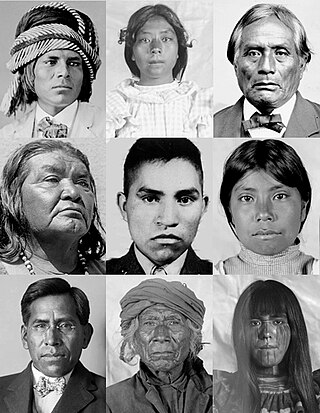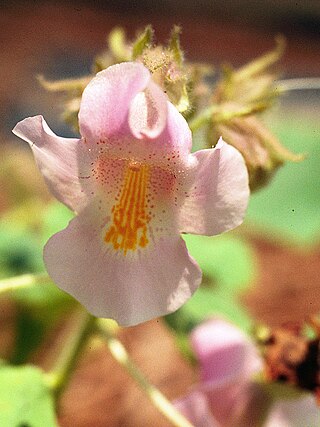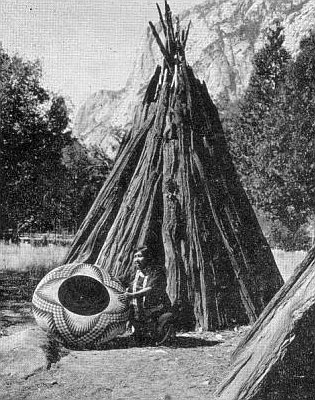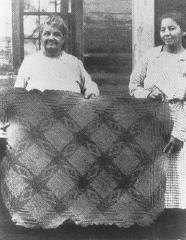
The Tohono Oʼodham are a Native American people of the Sonoran Desert, residing primarily in the U.S. state of Arizona and the northern Mexican state of Sonora. The federally recognized tribe is known in the United States as the Tohono Oʼodham Nation.

Senegalia greggii, formerly known as Acacia greggii, is a species of tree in the genus Senegalia native to the southwestern United States and northern Mexico, from the extreme south of Utah south through southern Nevada, southeast California, Arizona, New Mexico and western Texas to Baja California, Sinaloa and Nuevo León in Mexico. The population in Utah at 37°10' N is the northernmost naturally occurring Senegalia species anywhere in the world.
Food sovereignty is a food system in which the people who produce, distribute, and consume food also control the mechanisms and policies of food production and distribution. This stands in contrast to the present corporate food regime, in which corporations and market institutions control the global food system. Food sovereignty emphasizes local food economies, sustainable food availability, and centers culturally appropriate foods and practices. Changing climates and disrupted foodways disproportionately impact indigenous populations and their access to traditional food sources while contributing to higher rates of certain diseases; for this reason, food sovereignty centers indigenous peoples. These needs have been addressed in recent years by several international organizations, including the United Nations, with several countries adopting food sovereignty policies into law. Critics of food sovereignty activism believe that the system is founded on inaccurate baseline assumptions; disregards the origins of the targeted problems; and is plagued by a lack of consensus for proposed solutions.

The Akimel O'odham, also called the Pima, are a group of Native Americans living in an area consisting of what is now central and southern Arizona, as well as northwestern Mexico in the states of Sonora and Chihuahua. The majority population of the two current bands of the Akimel O'odham in the United States are based in two reservations: the Keli Akimel Oʼodham on the Gila River Indian Community (GRIC) and the On'k Akimel O'odham on the Salt River Pima-Maricopa Indian Community (SRPMIC).

Proboscidea is a genus of flowering plant in the family Martyniaceae, some of whose species are known as devil's claw, devil's horn, ram's horn, or unicorn plant. The plants produce long, hooked seed pods. The hooks catch on the feet of animals, and as the animals walk, the pods are ground or crushed open, dispersing the seeds. The name devil's claw is shared with the South African plant Harpagophytum procumbens.

Basket weaving is the process of weaving or sewing pliable materials into three-dimensional artifacts, such as baskets, mats, mesh bags or even furniture. Craftspeople and artists specialized in making baskets may be known as basket makers and basket weavers. Basket weaving is also a rural craft.

Tohono Chul is a botanical garden, nature preserve, and cultural museum located in Casas Adobes, a suburb of Tucson, Arizona. The words "tohono chul" translate as "desert corner" and are borrowed from the language of the Tohono O’odham, the indigenous people of southern Arizona. The mission of Tohono Chul is to connect people with the nature, art and culture of the Sonoran Desert region and to "inspir[e] wise stewardship of the natural world".

I'itoi or I'ithi is, in the cosmology of the O'odham peoples of Arizona, the creator and God who resides in a cave below the peak of Baboquivari Mountain, a sacred place within the territory of the Tohono O'odham Nation. O'odham oral history describes I'itoi bringing Hohokam people to this earth from the underworld. Hohokam are ancestors of both the Tohono O'odham and the Akimel O'odham. He is also responsible for the gift of the Himdag, a series of commandments guiding people to remain in balance with the world and interact with it as intended.

The Tohono Oʼodham Nation is the collective government body of the Tohono Oʼodham tribe in the United States. The Tohono Oʼodham Nation governs four separate pieces of land with a combined area of 2.8 million acres (11,330 km2), approximately the size of Connecticut and the second largest Indigenous land holding in the United States. These lands are located within the Sonoran Desert of south central Arizona and border the Mexico–United States border for 74 miles (119 km) along its southern border. The Nation is organized into 11 local districts and employs a tripartite system of government. Sells is the Nation's largest community and functions as its capital. The Nation has approximately 34,000 enrolled members, the majority of whom live off of the reservations.

Native Seeds/SEARCH, founded in 1983, is a nonprofit conservation organization located in Tucson, Arizona in the United States.

The visual arts of the Indigenous peoples of the Americas encompasses the visual artistic practices of the Indigenous peoples of the Americas from ancient times to the present. These include works from South America and North America, which includes Central America and Greenland. The Siberian Yupiit, who have great cultural overlap with Native Alaskan Yupiit, are also included.
Annie Antone is a Native American Tohono O'odham basket weaver from Gila Bend, Arizona.

Proboscidea louisianica is a species of flowering plant in the family Martyniaceae. Its true native range is unclear, but probably includes parts of the southwestern United States and Mexico in North America. It occurs in other areas, including other regions in North America, Europe, Australia, and South Africa, as an introduced species. It is the most widely distributed species in its family. Common names it shares with other Proboscidea species include devil's claw and unicorn-plant. Names more specific to the species include common devil's claw, ram's horn, aphid trap, Louisiana unicorn-plant, purple-flowered devil's-claw, goat's head, and elephant tusks.
Enei Begaye, of the Diné (Navajo) & Tohono O'odham nations, is an activist and advocate for indigenous peoples rights and the environment. Enei is an experienced grassroots organizer, speaker, writer, and strategist. She has been married to Mr. Evon Peter, Vice Chancellor for Rural, Community & Native Education, University of Alaska Fairbanks since 2003.

Hidalgo (state) handcrafts and folk art are mostly made for local consumption rather than for collectors, although there have been efforts to promote this work to a wider market. Most are utilitarian and generally simply decorated, if decorated at all. The most important handcraft traditions are pottery, especially in the municipality of Huejutla and textiles, which can be found in diverse parts of the state. Most artisans are indigenous, with the Otomi populations of the Mezquital Valley being the most dominant. Other important handcrafts include basketry, metal and wood working.

Iva Casuse Honwynum is a Hopi/Navajo artist, social activist, and cultural practitioner. A Native American, Honwynum is best known for her woven baskets and figurative sculpture. Honwynum's most important breakthrough was the development of the pootsaya basket, called "a rare innovation in Hopi basketry". She developed the pootsaya during her 2014 residency at the School for Advanced Research in Santa Fe, New Mexico, having been awarded the Eric and Barbara Dookin Artist Fellowship.
Alexandra Cunningham Cameron is an American curator of contemporary design and the first Hintz Secretarial Scholar at Cooper Hewitt, Smithsonian Design Museum.

Christine Navarro Paul, a member of the Native American Chitimacha Tribe of Louisiana, was a celebrated basket maker and teacher.

Lena Frank Dick was a Washoe basket maker best known for her tight weaves and figurative designs. Her baskets were primarily aesthetic as opposed to utilitarian.
Don Weeke is an American fiber and gourd artist from Addieville, Illinois best known for combining basketry with gourds using natural materials from the environment. His work is regularly on display nationally at galleries and has been featured in art books, including Fiberarts Design Book 7, The Complete Book of Gourd Craft, and 500 Baskets.















